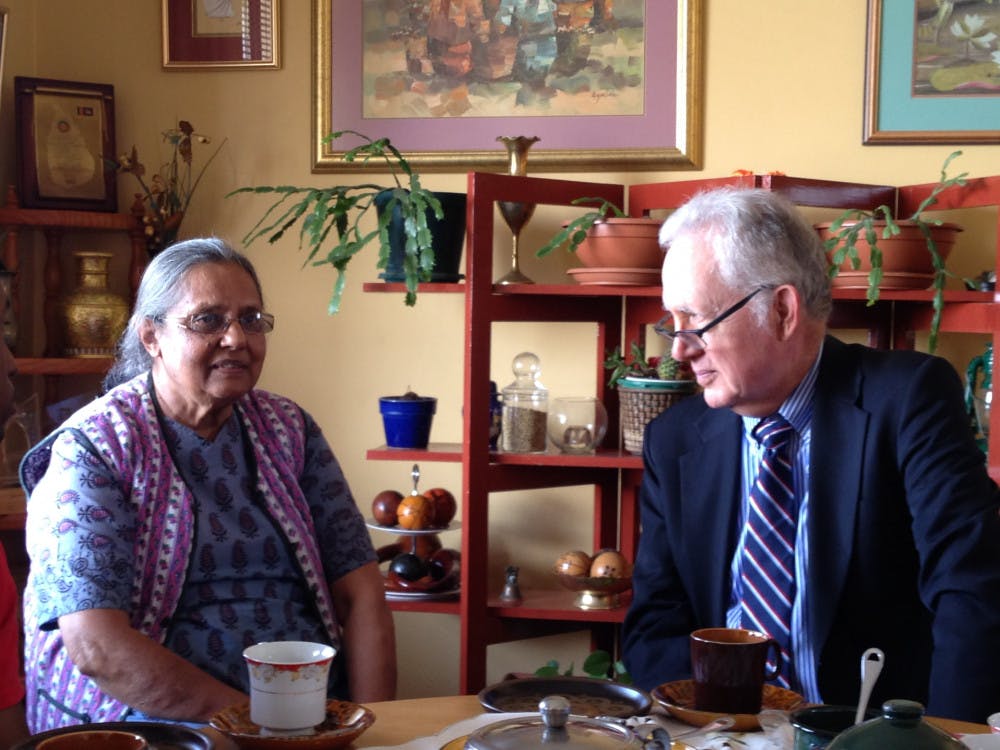By Lauren Longo & Stephanie Agresti
Correspondents

Ela Gandhi, peace activist and granddaughter of Mahatma Gandhi, invited 10 students to her apartment in South Africa for tea while they interned this past summer.
The interior of her home was humble, which students say complimented her countenance: A small piano stood among the beige walls and decor of her one-bathroom home. According to John C. Pollock of the College’s Communication Studies Department, Gandhi was “very modest, but quite elegant.” He said she downplayed her family’s suffering, which ranged from her nine years of house arrest to the assassination of several of her friends and loved ones.
Gandhi, who has lived in South Africa her entire life, has always been heavily involved in South Africa’s fight for liberation. Her role with the then-banned African National Congress (ANC) resulted in a nine-year house arrest. Gandhi steadily told students stories of her non-violent activism, only to pause before sharing her most intimate struggle. Her eyes clouded over before she telling the audience that the her eldest son was assassinated by the apartheid regime.
Once majority rule was gained and the ANC was liberated, Gandhi was elected to the first parliament, where she was a leader in writing two key provisions to the South African Constitution, focusing on religious freedom and women’s rights. As a result of her activism, Gandhi received the most prestigious civilian awards in both South Africa and India.
Gandhi also spoke warmly of her grandfather, who was assassinated when she was seven years old. Mahatma Gandhi was known for being a self-disciplined man, and he made sure to allocate one hour of his daily routine to spend with his grandchildren. She recalled him teaching her how to spin cotton to yarn, which was another task he practiced daily.
Students were honored when Ela Gandhi asked them to stay longer than their original meeting time had called for, saying she’d put on another pot of tea. She let them know that she had been eager to meet them, and sent them a thank you note before they had the chance to send her one.
The tea with Gandhi served as a time of reflection and inspiration for students.
“Ela Gandhi is an incredibly inspiring woman,” self-designed public health major and internship participant Isabelle Tan said. “Throughout her life, she constantly fought for her beliefs. Even as a young girl, she would walk to school every single day because her parents were against formal education. She is so passionate about change and equality. Meeting her gave me so much hope and ambition to challenge public health issues and social inequality.”
During their time in South Africa, students also shadowed DramAidE, a non-profit organization out of the University of KwaZulu-Natal, learning how entertainment education can be utilized in the fight against the spread of HIV/AIDS. Organizations like DramAidE implement entertainment education techniques, such as allowing students to participate in theatre performances, integrating public health communication campaigns into societies suffering from large-scale public health issues.
Meeting with Gandhi’s granddaughter helped students connect entertainment education strategies with a public need.
“South Africa needs help from other people, but we cannot be instilling our ideas in South Africa,” communication studies and biology double major James Etheridge said. “We have to help people help themselves. (Gandhi) showed throughout her life that, no matter how difficult it is, you have to hold on to what you’re fighting for, or else, what are you fighting for?”
Etheridge also stressed the importance of spending time abroad.
“I chose to go to South Africa because I wanted to study abroad, but I also really wanted to experience what it was like to engage in public health,” he said. “I wanted to go somewhere very different from what I was used to. I got to go out there and experience all that I’ve read about and see what the people of these countries are going through.”
The internship abroad afforded students the opportunity to connect with scholars and interact with individuals at institutions such as the Valley of 1,000 Hills HIV/AIDS Orphanage and Hospice and the Esizibeni Sivananda Vaswani Comprehensive High School. Students from the College were fully immersed in public health initiatives in the field, providing them with a thorough understanding that no classroom could provide.
“South Africa is a country that needs people to visit it in order to understand what (its people) are going through,” Etheridge said.










